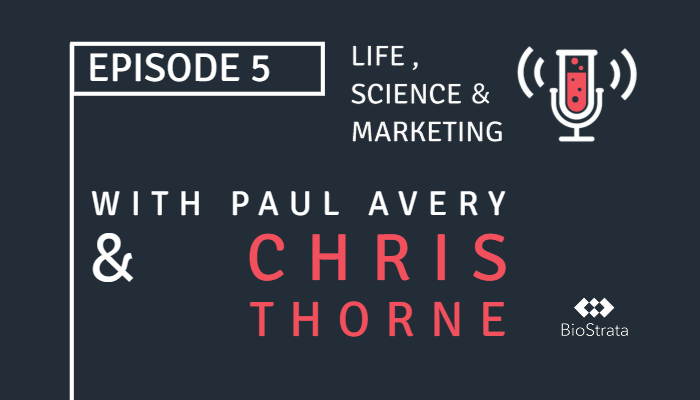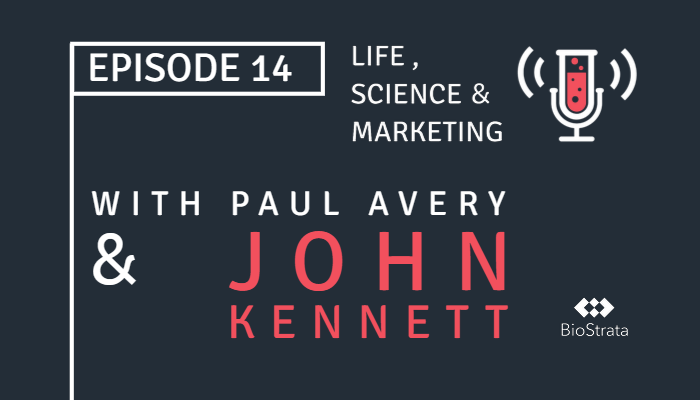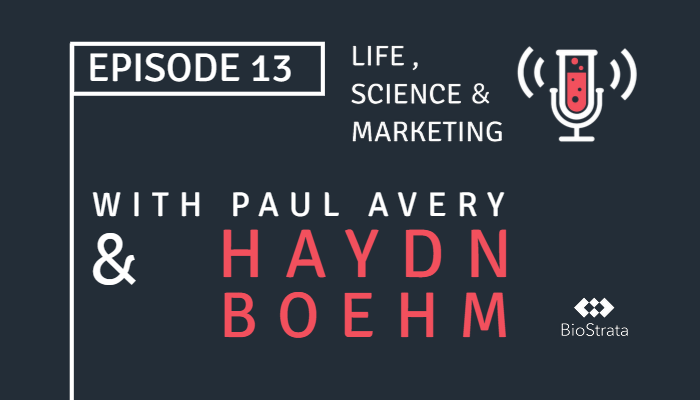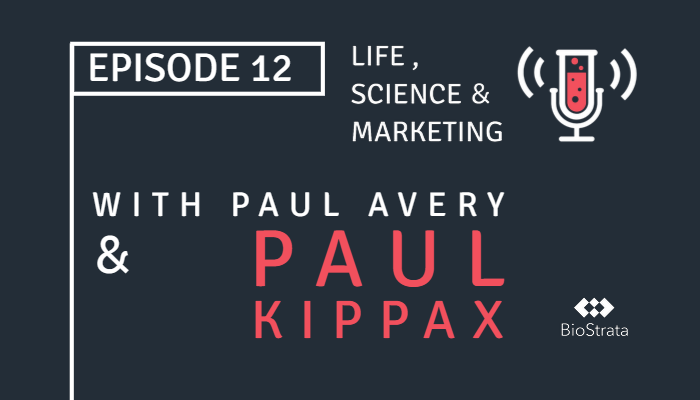Chris Thorne: The importance of proactive networking, conveying science effectively, and overcoming common obstacles in life science marketing
Our "Life, Science and Marketing" podcast features in-depth discussions between host and BioStrata CEO Paul Avery and marketing professionals across the life sciences industry. In each episode, guests share their backgrounds, experiences, and advice on marketing strategies and best practices.
In episode 5, Paul had an engaging discussion with Chris Thorne, Director of Marketing at Asimov. With experience spanning scientific research, startups, and product marketing, Chris provided valuable perspectives on the importance of relationship-building, communicating complex concepts clearly, and overcoming common obstacles faced by life science marketers.
Read on for a summary of episode 5 and Chris’ journey from PhD cancer researcher to leading marketing initiatives at innovative life science companies. You can also listen to the full conversation in the podcast episode below or find us on your favourite podcast platform.
How did you get to where you are today in your marketing career?
Chris Thorne: I did my bachelor's degree in Nottingham before completing my PhD in cancer cell biology at the University of Liverpool. During my undergraduate studies, I worked at AstraZeneca for industrial placement years, which gave me a taste for commercial science. After finishing my PhD, I wanted to get back into the science industry so I moved to the biotech startup Horizon Discovery in Cambridge. This was exciting because gene editing was taking off at the time and CRISPR arrived on the scene while I was there. Working at startups gave me opportunities to try different things - I worked in R&D, ran a scientist team, worked in operations, and did some commercial work.
My growing curiosity about how we communicate science led me to read books on business and digital marketing in my spare time. I started practicing skills like website development, email marketing, and public speaking. This allowed me to make the case to transition into the marketing team full-time at Horizon. Since then I've had various marketing roles at companies like Asimov, gaining experience in areas like product management and marketing strategy.
What have you found to be most important for your success?
Chris Thorne: In addition to the results my teams have achieved, the relationships within my company have been crucial for success. This includes immediate team members but also the extended network of stakeholders, agencies, and trusted contacts. I recommend proactively building and maintaining professional relationships throughout your career. This provides access to referrals, job opportunities, business introductions, and other benefits down the road. While building relationships requires substantial time and effort, maintaining them is relatively easy through occasional check-ins. A little thought and effort like holiday messages or 6-month catch-up notes on LinkedIn go a long way. What you don't want is for the first outreach to be a request, so having a cadence of casual relationship-building touchpoints keeps doors open. Though specific tactics may differ, being intentional about networking establishes a real professional asset.
What aspects of your marketing role do you enjoy the most?
Chris Thorne: I was attracted to marketing because I think science is really interesting, but scientists tend to hide behind data rather than tell stories well. I love taking difficult scientific concepts and communicating them elegantly to audiences. There's also an analytical science to marketing itself - using data to drive decisions on campaigns and track performance metrics. On a personal level, I really enjoy building out robust, scalable systems and teams so that the marketing function runs smoothly even if I step away. It's incredibly satisfying to see all the pieces click together, from initial communications to incoming leads converted into revenue, with everyone understanding how the funnel works.
What are the most important lessons you have learned throughout your marketing career?
Chris Thorne: While having a clear, authentic message resonate with your audience is crucial, I've found that the relationships within a company are also essential to achieve success. This includes not just your immediate team members, but also the extended network of stakeholders, agencies, and trusted contacts. Proactively building and maintaining professional relationships provides access to resources, referrals, new opportunities, and other support that aids your initiatives. Regularly networking and checking in periodically to strengthen those bonds for the long term has proven invaluable.
What scientific area have you found most interesting to work on?
Chris Thorne: On a personal level, I find epigenetics absolutely fascinating. The idea that environmental exposures can alter gene expression through epigenetic modifications is really cool. Bees can be genetically identical but have different roles as workers or queens based on epigenetics. We can even read someone's epigenetic markers to know if they were a lifelong smoker. The potential future applications for epigenetic diagnostics using circulating DNA in liquid biopsies could be game changing. Currently I'm also excited about the work I'm doing at Asimov on tools for computer-aided biology. We're building software and complementary lab products to help scientists reliably design and engineer biological systems. This has already improved outcomes in areas like biologics manufacturing and gene therapy. I'm energized by the future potential as we accumulate data to further enhance prediction abilities and aid global scale-up of biological engineering.
What are some big challenges for life science marketers today?
Chris Thorne: Some major challenges stem from decreased audience attention spans due to information saturation. We receive hundreds of pitches across email, social media, and other channels daily. This constant noise has trained us to mentally filter most of it out. Combined with shortened attention spans, we have to work harder as marketers to identify our specific audience and craft targeted messaging that authentically connects with them. We can't just blast emails and hope for the best anymore. Resources are typically constrained as well, so we must be smart about how time and budget are allocated. To stand out, sometimes uncomfortable, bold marketing moves are required. But this involves risk and exposure, requiring leadership buy-in. Building systems to track performance helps optimize activities and spend. While the skills needed are rapidly evolving, maintaining a professional network provides invaluable support to overcome these obstacles.
What does being brave as a marketer look like in practice?
Chris Thorne: Bold moves should fit your brand - you can't work in diagnostics then have someone in a hot dog costume gather leads. But conferences let you be eye catching, like having llamas at our booth to highlight llama antibodies. Creative B2B campaigns connect emotionally about improving work rather than just touting features. This makes your offering relatable while standing out from safe, undifferentiated messaging.
In your experience, how does the importance of marketing translate into investment at life science companies?
Chris Thorne: The scope of marketing activities affects budget size and team composition. Marketing can span strategic product positioning, go-to-market planning, tactical lead generation campaigns, and sales support. Budgets can derive from ideal spend on marketing activities or required revenue goals to work backwards from. Teams range from primarily marketing-led ecommerce models to those heavily supporting field sales teams. Overall investment is often constrained, requiring clever and targeted use of time and money. However, upfront investment in systems, processes and infrastructure can greatly aid efficiency, even if attribution to revenue remains imperfect. Despite tight budgets, some calculated bold spending upfront enables longer-term marketing success.
What is your top marketing tip for life science marketers?
Chris Thorne: The concrete marketing skills needed are changing quickly as AI and other technologies emerge. However, despite these shifts, building and intentionally maintaining professional relationships remains crucial. My top advice is to keep marketing capabilities sharp, but also proactively nurture your network. The connections you build will always be invaluable, providing support as marketing continues to evolve. Make relationship-building a priority alongside staying on top of the latest marketing best practices.
How can marketers determine which efforts are having the biggest impact?
Chris Thorne: There's a tendency to think digital tracking solves attribution, but in-person interactions remain a "black box". No way currently exists to fully track conference impact or real-world encounters. While tools like HubSpot automate online tracking, the human experiences elude comprehensive measurement. I hope we never reach the point of recording every sales interaction for analysis - privacy should be protected. So by definition some attribution uncertainty will always exist in determining marketing effectiveness.
Dive further with 'Life, Science & Marketing' discussions
As we conclude our insightful chat with Chris Thorne, we extend our gratitude for his willingness to delve into his experiences and guidance. Chris is always receptive to ongoing discussions, fielding questions, and elucidating further on his career and knowledge. Feel free to connect with him on LinkedIn.
Keep an ear out for the upcoming episode of "Life, Science and Marketing". We're excited to present you with stimulating dialogues and actionable advice from leading experts in the life sciences marketing realm.
Stay updated by following the official Life, Science and Marketing LinkedIn page, where you'll find the newest podcast episodes, announcements, and marketing wisdom.




